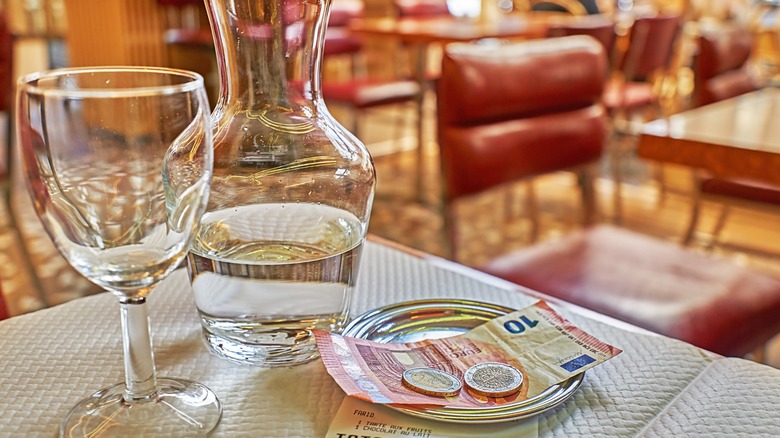The Money Mistake To Avoid When Dining In Italy
Traveling to a foreign country is a heady, thrilling experience, especially for foodies eager to eat their fill of the local cuisine. Italy is one of the world's ultimate culinary destinations, from transcendental pizza to some of the freshest seafood you'll ever taste. We've previously covered mistakes you're making when ordering traditional Italian food, and the essential words and phrases to know in an Italian restaurant, but you should also be informed of another critical point of cross-cultural etiquette before you dine out in Italy: How to tip appropriately.
Some folks believe that Italians don't tip, but this isn't entirely true. Tipping isn't compulsory or as generous as in America, but that doesn't mean you shouldn't show your appreciation for great service. Particularly in big tourist towns (like Rome) or in high-end dining situations, a modest tip is not necessarily expected, but also will not be amiss. Seasoned travelers suggest an extra Euro or two for gratuity, but not more than 10% of the bill. And, yes, you should carry coins or bills, because Italian credit card readers won't give you the option to tip on your card the way you are used to in the States. Be sure to hand your cash tip directly to your server, along with a smile and a polite "grazie." And don't give your server American money — this is a faux pas, as they will then have to go through the hassle of exchanging it.
Tipping in Italy is a nuanced subject
If you choose to leave a tip at an Italian restaurant — and your server will likely be quite happy if you do — there are a few additional points to keep in mind. Even as of this writing, there's a compelling reason to use cash when dining in Italy, because, anecdotally, many smaller or family-owned restaurants don't take cards. Do your research before sitting down at a new place and finding out the hard way that your credit card isn't accepted!
If you see a "coperto" charge on your bill, this is similar to a service fee and is not a tip shared with the waitstaff. Think of this as a cover charge for taking up a table in the restaurant. It may also cover the cost of the bread and olive oil that is served to you before your meal, but note that it's impolite to refuse it or ask for it to be removed from the bill.
American travelers have noted online that, when restaurant staff discover that they are from the U.S., the servers are more likely to expect a tip and may even make leading comments. Culturally, Italians wouldn't stand for this and might even argue back! There's no need to go that far, but don't feel pressured to tip more than you are comfortable with, or feel bad if you grab something quick from an osteria and don't have any cash on you.

